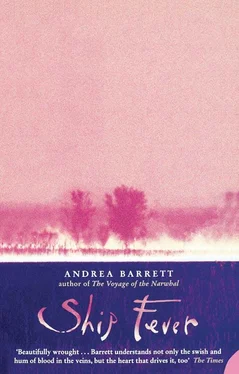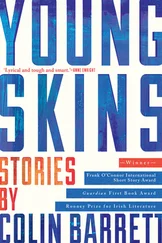Were you frightened?
Not frightened, exactly. Years ago, when Aunt Agnes was sick, we had taken turns nursing her. Our father wasn’t around very much; the winery was flourishing and he was busy becoming rich. During the time when we were alone with her, we had learned about the relentless disintegration of the body. Perhaps you’re familiar with this — the drying and thinning of the skin, until the slightest blow or scratch leaves blood behind. The rubbing together of fleshless bones, the sores and bruises and rashes and welts, the loosening teeth and the bleeding gums, the clumps of hair coming out in the comb, and the alternating waves of hunger and nausea. All of this was familiar to us; none of what was happening to our father was unexpected. Although we were, of course, surprised that he was still drinking so heavily. And the first night we stayed in the house, before we became used to it, we were surprised to find the two huge dogs in bed with him, their heads on pillows and their paws thrown across his body.
Tell me what you left behind.
Men. Several men, for one of us; for the other a lover with jet-black hair and narrow feet, who had ended a long dry spell in Boston like a flow of cool water. The skin over this man’s ankles was pale and so thin that the blue veins were visible, and this seemed lovely until the day we had to bathe our father’s feet and saw the same veins over the ankle, beneath the dry and fragile skin. Our father wore baggy boxer shorts that gaped at the fly when he bent to pat one of the dogs or pick up a bone or a brush. He had always done this, but we had not lived with him for many years and had forgotten how disturbing it was. The men with whom we share our beds wear narrow pants that cling closely to their bodies.
And what did she leave?
The wife?
Her.
She took off so fast she left half of what she owned behind. We weren’t sorry to see her go. There had been several women since your departure and she was the worst of them. We disliked her voice, which was affected and loud. She left behind a blue hassock embroidered with swans, several sets of expensive sheets, a cabinet full of cosmetics, and a refrigerator full of food. She had cooked for our father; all of them did.
She’d begged him to sell the house and the winery, so they could be free to travel. It was time, she said. After half a century of being tied to that piece of land. We think she also hoped, in the back of her mind, that by freeing himself of the property he might free himself from you. For a while he kept your portrait over their bed in the rented house, although she objected. After their first trip, to the Grand Canyon, she came home and moved your portrait to the basement. The second trip, the one to Bordeaux, went badly as well. What could she have been thinking? That the chateaux and the acres of vines on the stony soil would not remind our father of what he’d given up for her? It was then, we think, around this time, that she realized the house and the land and the vines had been a large part of what had attracted her to him. She was forty-five and on good days looked younger. She bought some clothes and went off to Syracuse and found a job, from which she returned to the rented house on weekends. Halfway present, halfway absent. In her absence, our father seemed unable to feed himself.
Where did the money go?
We don’t know. Grapes were down, and so was the price of land, and he didn’t get what he should have for the property. Then there were trips, and bad investments; probably she took the rest. Who can say? When we arrived, we cleaned out the refrigerator. We found a red enamel pot containing the remnants of a barley mushroom casserole, part of a pork roast gone slimy and slick, four half-empty cartons of milk, liquefied broccoli, rotten lettuce, three-quarters of a red pepper, a container of instant pancake batter, old bacon, stale bread, moldy cheese, dead fruit. On the porch were large boxes full of old vegetables, which our father said had come from the produce stall in the village and would otherwise have been thrown out. Much of the money had disappeared in the year before he got sick, but he refused to talk about this with us. On the porch, where we sat for an hour in the warm sun while our father was taking a nap, we looked at the lake and the fallen trees and the expensive lawn furniture now rusted and worn, and one of us said to the other, “This is a different way of being poor.”
We had a problem, we knew: the problem of our father, who could not feed himself, and the dogs, who could not feed either themselves or our father and also could not walk themselves. We had lives of our own, elsewhere, and soon we would have to go. In those other lives, in our real lives, we sank down at night into beds with men who were precious to us, who had strong thighs, strong arms. But during this visit we slept with no men. We slept with each other, on the bed that was not a bed, and when we rose we fixed our father breakfast and then went to the market and bought more food and then came home and fixed him lunch and fed the dogs as well. We walked the dogs in the marsh south of the lake. The largest dog, the white one, every day pushed his way through the weeds to the rim of black mud and sank down to his shoulders. When we came home, we wiped him off with a cloth. Always, before we were done, he tore himself from us and bounded into our father’s room and leapt up on the bed and curled himself next to his master.
You were jealous of the dogs?
Our father said, “They are all I have. They are the only ones who treat me affectionately.” He was talking about the dogs, not us. We were cleaning and cooking and shopping and wondering what to do; we couldn’t agree about anything. We argued about what we should do for him and how we should do it. One of us would want to peel fruit for him at the same moment the other decided he needed meat, a roast. Sun or shade, hammock or bed, hot tea or cold juice — always chaos, always conflict. We quarreled one night, when he said he’d like ice cream: which of us should be the one to fetch it and which the one to stay behind with him, for a private moment when we might be redeemed. We wore him out, and for all that, neither could feel like his favorite.
Our father sat on one of those wrought-iron chairs that had served as decoration in the summer-room of our old house, but which here had become the sole, inadequate kitchen furniture. A moth flew against the window over the sink and then fell into the standing water and drowned. Our father had always been a small man, but we had never noticed it before. After he ate he felt tired and went back to bed. The white dog lay like a person beside him.
His head on the pillow?
On two pillows, turned to face our father. We went to the store. We bought spinach fettucine and fish and grated hard cheese and butter and muffins and coffee and cream, and when we came home we washed the kitchen floor, which was suddenly, mysteriously, covered with small ants. Against the baseboards were drifts of dog hair. A doctor called and then another; appointments were made. In our houses, we told each other, the counters shone in the sun. At night we undressed in darkness and avoided looking at each other’s bodies. You know how differently we are built — one tall and rounded, one short and spare — but in the light of our father’s disintegration we seemed identical in our health and smoothness. Our father told us a story about your mother, our grandmother, and how she and Agnes and your other aunts were raised by their mother after their father died and left them the vineyard and no men to cultivate it. In the Ukraine, he said, at about the same time, his father, our grandfather Leo, was struggling to establish vineyards for Stalin. He said our family had been drawn together by forces that felt like fate. Later he mentioned that he had borrowed heavily against his life insurance and had not been able to pay the money back.
Читать дальше
Конец ознакомительного отрывка
Купить книгу












